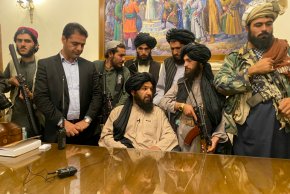This collapse illustrates the folly of American and British attempts to democratise a country that isn’t either ready or willing for such a system after dealing with an insurgency. None that they have tried have succeeded. Malaya, Vietnam, Greece, Iraq, and now Afghanistan. In each of those cases they ignored the facts on the ground such as the ethnic and religious dynamics. In the case of India this has lead to war between Pakistan and India and continued friction over Kashmir. In Malaya it has lead to the domination of the Malay over an almost equal Chinese population numbers wise, the secession of Singapore as a separate nation, with tensions between Malaysia and Singapore, more often than not instituted by the Malaysian side.
In the cases of Vietnam, Iraq and Afghanistan the US went in guns blazing. In Vietnam it never won the combat side of the war, despite the resources it threw at it. To many politicians playing at generals and to many generals playing at politicians. Also the South Vietnamese government was corrupt, inefficient, brutal, and thoroughly penetrated by VC (Viet Cong) and NVA (North Vietnamese Army) agents. Whenever the US cleared an area of VC and NVA, then handed it back to the South Vietnamese, the VC and NVA fully reinfilitrated it within days. In Iraq and Afghanistan the US won the war but have lost the peace. They planned resolutely and thoroughly for the war, but in neither case did they ever plan for the peace that comes afterwards. Compared to winning the peace winning the war is the easy bit. Its also the cheaper part of the job. No-one gave any thought to what they would do when the shooting stopped. If they had a plan formulated well before they went in, the long wars would not have occurred. The insurgents would not have had fertile breeding grounds of discontent with corrupt elites, sectarian and ethnic divisions. The US didn’t understand the ethnic, political, social, religious landscapes of the environments that it was going into and that ignorance has cost it and its partners thousands of lives and over US$2 trillion.
This is an utter and complete failure for the US. Biden isn’t the fall guy – he’s the POTUS in the hot seat when it happened. The responsibility lies squarely with the Bush White House of 2001 – 2008 when it failed to adequately plan ahead. In Afghanistan in 2003 they had the perfect opportunity to plan for the peace. They didn’t. They went into Iraq instead in a war of wanton aggression because that was what it was. There was no legal reason for the 2003 invasion of Iraq. And the US has failed at that too, even more so than in Afghanistan, because it has given Iran far more influence and control in Iraq than it’s ever had before. Great strategy that.
In the future it would probably be better for US foreign policy and geostrategic considerations to desist from foreign adventures such as these, because clearly they are gross failures that are costing the US a fortune in treasure, blood, and prestige.




